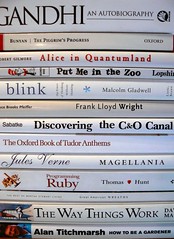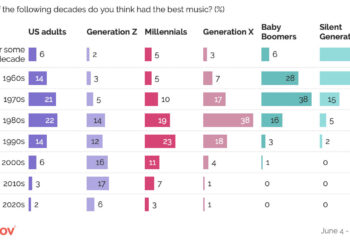
- Image by Vicki’s Pics via Flickr
We’ve all had that experience — you buy a book with a fascinating premise, then soon learn that the first 1-3 chapters exhausted the main idea and the rest of the book was filler.
Nicholas Carr has recently published a book called, “The Shallows,” extending the ideas from his Atlantic cover article, “Is Google Making Us Stupid?” into a book-length manuscript. I haven’t read the book, so I don’t know if it’s one of those books that’s 1/3 robust and 2/3 fluff, but recent discussions about Carr’s ideas certainly make me wonder if the book’s main idea is even worth pursuing at all.
Carr’s argument in the Atlantic article was that the age of superficiality and distraction was changing our minds, literally, from one capable of contemplation to one seeking novelty, superficially scampering from one idea to the next, while finding it difficult to do real thought. I’ve listened to interviews with him about the book, read multiple reviews, and read Carr’s related blog posts.
But it was in a riposte where I found the most compelling argument — a sensible response by Steven Johnson at the New York Times (their “Unboxed” blog), in which he argues that while there must be a price we pay for distractedness coming from multi-tasking, Carr overlooks the benefits, neglecting to see if the sum total is an improvement:
The problem with Mr. Carr’s model is its unquestioned reverence for the slow contemplation of deep reading. . . . It’s no accident that most of the great scientific and technological innovation over the last millennium has taken place in crowded, distracting urban centers. The printed page itself encouraged those manifold connections, by allowing ideas to be stored and shared and circulated more efficiently.
Books are an interesting case in point. They represent our longstanding desire to network information — in the case of books, to create durable information packets we could share widely and possess as our own. By sharing ideas with fidelity and durability, the world changed. As Johnson offers:
One can make the case that the Enlightenment depended more on the exchange of ideas than it did on solitary, deep-focus reading.
Our transactions around books today as commercial objects leads to us filling them with fluff in order to create a doorstop big enough to justify a retail price of $24.99. But in the early days of books, thin monographs and short treatises abounded. Books were distracting, lining the walls of homes, lying around in stacks, their spines and covers calling out to people, “Read me — I’ll transport your mind to a different place.”
If reading weren’t distracting, why would we do it? We seek new ideas, new inspirations, new stimulation for our minds.
Reading, even contemplative, solitary reading, is about being distracted, as is listening to a symphony, attending a talk, or walking through a museum. How our minds process these distractions is what’s important, and lateral thinking and creative connections seem to bring us farther forward than anything I would consider to be “deep thinking.” The positive effects of serendipity and the list of “Eureka!” moments dominate the history of ideas.
Bring on the distractions (by reading Johnson’s short and interesting take on this).
Discussion
11 Thoughts on "Does Thinking Benefit More from Contemplation or Exchange?"
How meaningful is it really that much scientific discovery occurred in cities? Isn’t that just assuming correlation equals causation? Isn’t this more likely due to a concentration of population and money than on some magical cognitive boosting powers inherent in busy cities?
Combined with the translational thinking and lateral thinking — and anecdotes about how analogies, happenstance, and surprising insights inspired these — it seems safe to assert that discovery probably benefits some from a more frantic information space. If it were just “living in a city,” we’d have cured the common cold decades ago.
Who knows? Maybe it’s having a plethora of dining options that sparks scientific insights. I’ll bet I know people who’d be willing to test that hypothesis.
What does this say then, about the relatively suburban Silicon Valley?
That bright people of means want to move from cities to live in moderate climates and relatively suburban environments?
On the contrary, smart new companies choose to setup shop in Silicon Valley precisely because of the concentration of smart people and smart companies. Stanford University was there before Apple or HP. It’s really not so far from San Francisco. I’d hazard to guess that electronics manufacturers and silicon chip makers probably built their facilities in Silicon Valley because it was close to San Fran but the rent was cheaper. The rents aren’t so cheap anymore because everyone wants to be where the action is.
You write: “Nicholas Carr has recently published a book called, “The Shallows,” extending the ideas from his Atlantic cover article, “Is Google Making Us Stupid?” into a book-length manuscript. I haven’t read the book, so I don’t know if it’s one of those books that’s 1/3 robust and 2/3 fluff, but recent discussions about Carr’s ideas certainly make me wonder if the book’s main idea is even worth pursuing at all.”
OK, you’re judging – and seemingly dismissing – a book on the basis of (a) the flaws of some other books you’ve come across and (b) some discussions you’ve seen. Isn’t that just a little bit, um, shallow?
I take it the point is that what Carr calls distraction is often actually stimulation. But then you slide into this central point made by Johnson, which is directly related to scholarly publishing: “The printed page itself encouraged those manifold connections, by allowing ideas to be stored and shared and circulated more efficiently.”
Johnson’s point (and Carr’s as well it seems) is that reading supports contemplation precisely because the ideas stick around to be thought about. Once upon a time I did research related to this very point. It goes like this.
Every body of speaking and writing has an underlying issue tree structure. So my students and I compared the issue trees of meetings with those of issues that developed over time in the newspapers. In the papers the various statements were there in print so people could read and think about them over time. In meetings the statements were transitory, lacking what we called statement preserving media.
As a result the issue trees of meeting were very thin, with rates of branching of the lines of thought on the order of 1.3 branches per node or so. Issues developed in print over time were much richer, with branch rates of 3 or more. We measured what everyone knows, that meetings are not a medium of contemplation. By the same token emails and blogs are better than phone calls if the goal is contemplation.
In other words print is a medium of contemplation as well as communication. This is especially true for contemplation by groups, which is often the most important kind. Not only do the words move from one person to another, but they stay put when they get there.



